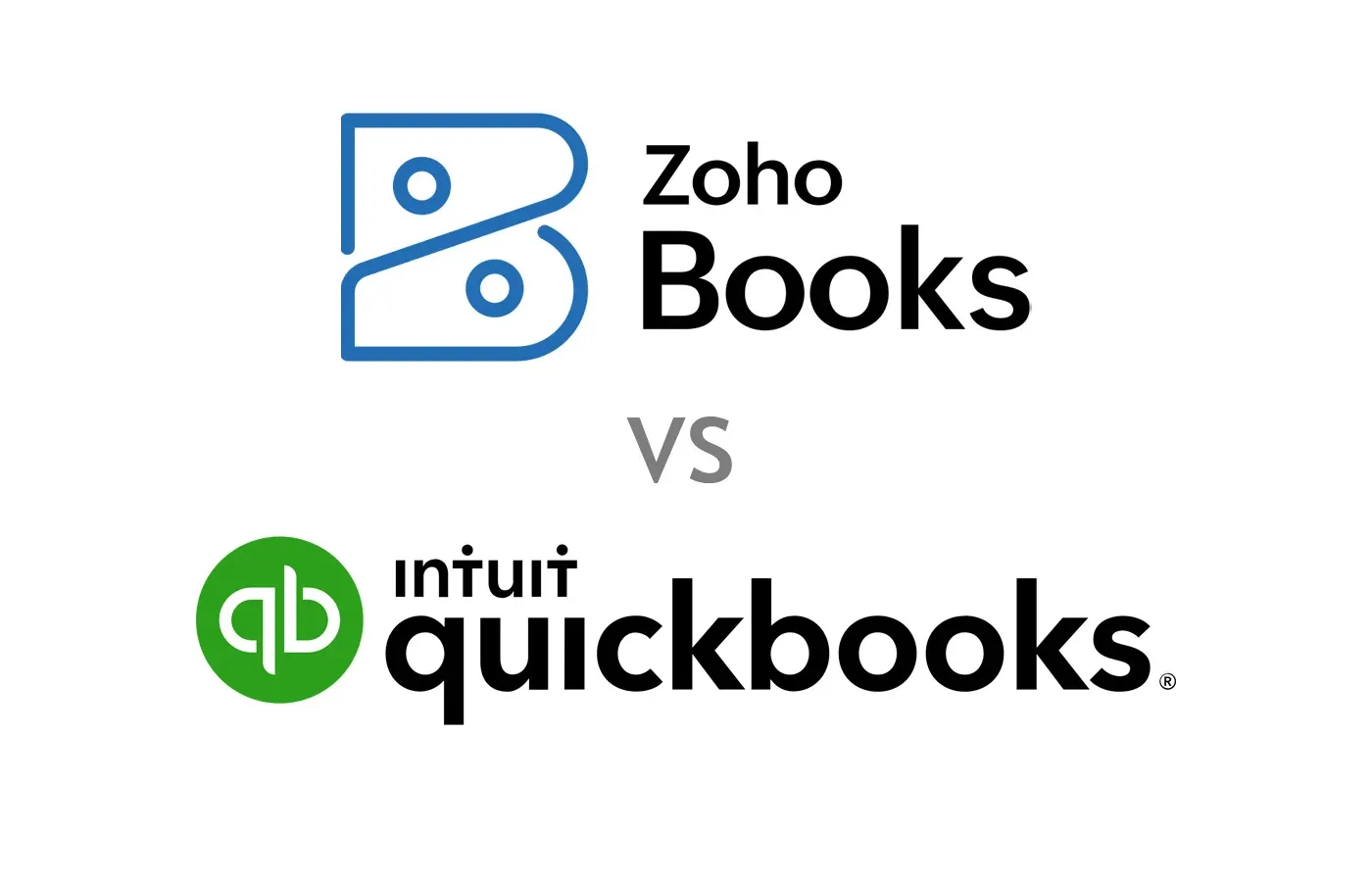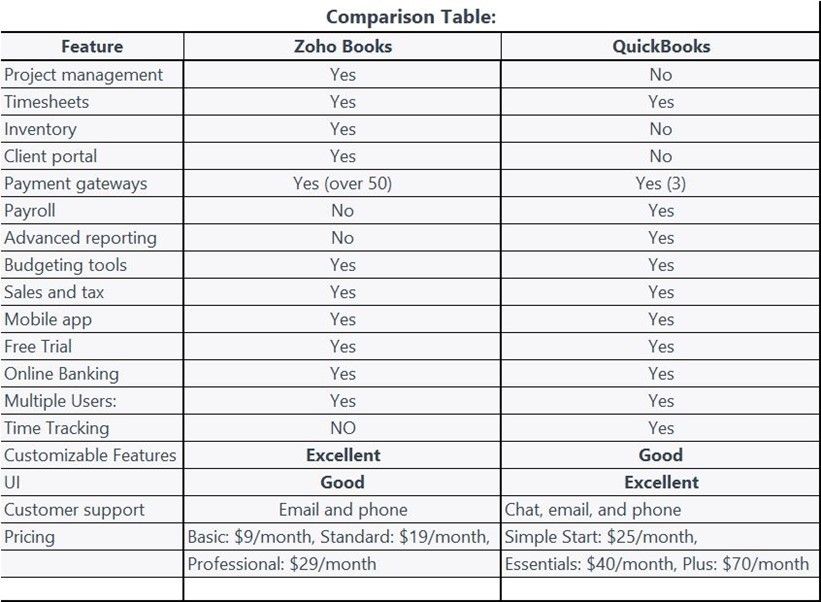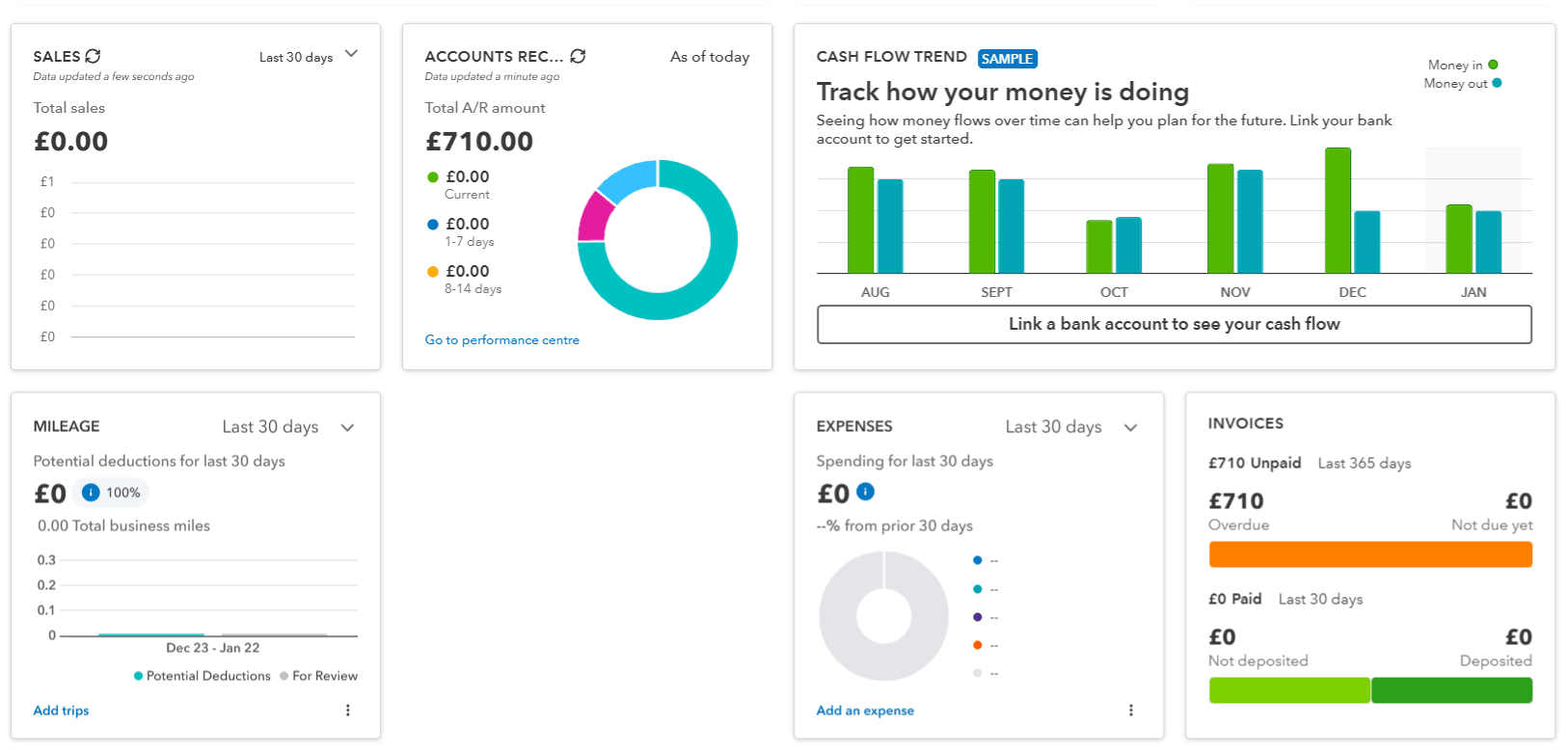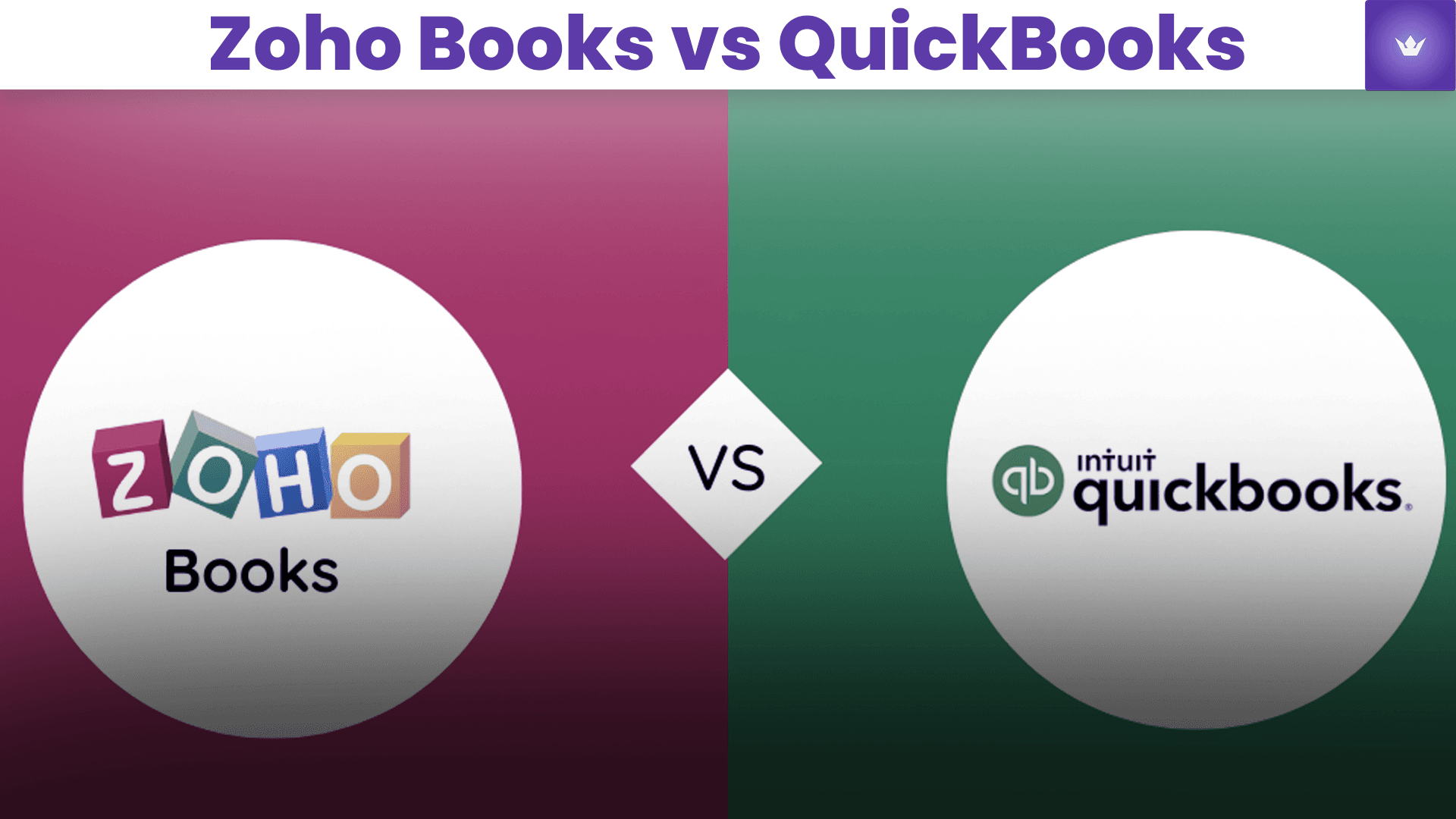Table of Contents
- Overview of Zoho Books and QuickBooks
- Key Features Comparison: Zoho Books vs QuickBooks
- Pricing Models: Zoho Books vs QuickBooks
- User Experience: Zoho Books vs QuickBooks
- Integration Capabilities: Zoho Books vs QuickBooks
- Security and Data Protection: Zoho Books vs QuickBooks
- Final Verdict: Which One is Right for You?
As we enter 2025, the landscape of business accounting software continues to evolve, with Zoho Books and QuickBooks remaining at the forefront of this digital revolution. If you're a business owner or accountant searching for the ideal accounting solution, this comprehensive guide will prove invaluable. We'll delve deep into the critical features, pricing models, user experiences, and more of these two leading accounting platforms. By the end of this article, you'll have a clear understanding of which tool might best suit your needs in the current business environment.
Overview of Zoho Books and QuickBooks
In the ever-changing world of accounting software, Zoho Books and QuickBooks have consistently maintained their positions as top contenders. Each platform offers a variety of features designed to simplify financial management for businesses of all sizes.
What is Zoho Books?
Zoho Books is a comprehensive cloud-based accounting software tailored for small and medium-sized businesses. Known for its user-friendly interface, Zoho Books offers robust features for managing invoices, inventory, payroll, and taxes, making it a holistic financial solution for businesses seeking efficiency and ease of use.
In recent years, Zoho Books has gained significant traction among startups and growing businesses due to its scalability and commitment to continuous improvement. The platform has introduced several AI-powered features in 2025, including predictive cash flow analysis and automated expense categorization, setting new standards in the industry.
What is QuickBooks?
QuickBooks, developed by Intuit, is a powerhouse in the accounting software industry and one of the most recognized brands globally. It provides a wide array of features suitable for both small businesses and enterprises, including detailed financial reporting, payroll processing, and tax preparation. Its scalability is one of its strongest assets, catering to various business sizes and industries.
As of 2025, QuickBooks has further solidified its position by integrating advanced machine learning algorithms to provide more accurate financial forecasts and personalized business insights. The platform has also expanded its global reach, now supporting over 180 currencies and tax systems in various countries.

Key Features Comparison: Zoho Books vs QuickBooks
When comparing Zoho Books vs QuickBooks, it's essential to examine their key features in detail. Both platforms offer a comprehensive suite of tools, but there are notable differences that could sway your decision.
Invoicing and Billing
Both Zoho Books and QuickBooks excel in invoicing and billing functionalities, but each has its unique strengths.
Zoho Books stands out with its ability to automate recurring invoices and send payment reminders, which can save businesses significant time. The platform also offers multi-language invoicing, a feature particularly useful for businesses operating in multiple countries. In 2025, Zoho Books introduced an AI-powered invoice prediction feature that suggests optimal invoice timing based on client payment history.
QuickBooks offers advanced invoicing options with customizable templates and seamless integration with popular payment gateways. The platform's latest update includes a feature that automatically detects and warns about potential duplicate invoices, reducing the risk of billing errors. QuickBooks also provides a mobile invoicing app, allowing users to create and send invoices on the go.
Expense Tracking
Expense tracking is a vital feature for any business to keep a firm grip on their financial outflow. Both platforms offer robust solutions in this area.
Zoho Books provides automated expense tracking with direct bank feeds for real-time expense management. The platform's OCR technology has been significantly improved in 2025, allowing for more accurate receipt scanning and data extraction. Zoho Books also introduced a feature that automatically suggests expense categories based on historical data and machine learning algorithms.
QuickBooks, on the other hand, offers an expansive receipt capture feature via a mobile app, simplifying the recording of expenses. The platform's 2025 update includes an AI-powered expense auditing tool that flags unusual or potentially fraudulent expenses, adding an extra layer of financial security for businesses.
Inventory Management
When it comes to inventory management, both platforms offer robust solutions, but their approaches differ slightly.
Zoho Books provides multi-warehouse management, inventory tracking, and automated reorder notifications. In 2025, they introduced a predictive inventory management feature that uses historical data and market trends to suggest optimal stock levels. The platform also offers a barcode scanning feature for easy stock taking.
Meanwhile, QuickBooks boasts a more extensive set of features, such as advanced inventory tracking and the ability to manage multiple locations. The platform's latest update includes an AI-driven demand forecasting tool, helping businesses optimize their inventory levels based on predicted sales. QuickBooks also offers integration with popular e-commerce platforms, allowing for real-time inventory syncing across multiple sales channels.
Financial Reporting
Both Zoho Books and QuickBooks offer comprehensive financial reporting capabilities, but there are some differences in their approaches.
Zoho Books provides a wide range of customizable reports, including balance sheets, profit and loss statements, and cash flow statements. In 2025, they introduced an interactive reporting feature that allows users to drill down into specific data points directly from the report interface. The platform also offers AI-powered financial insights, highlighting potential areas of concern or opportunities for improvement.
QuickBooks, known for its robust reporting capabilities, offers over 200 built-in reports. The platform's 2025 update includes a natural language processing feature that allows users to generate custom reports using simple voice or text commands. QuickBooks also provides industry-specific report templates, making it easier for businesses in various sectors to get the insights they need.
Tax Management
Tax management is a crucial aspect of any accounting software, and both Zoho Books and QuickBooks offer strong features in this area.
Zoho Books provides automatic tax calculations based on your location and business type. The platform supports multiple tax rates and can handle complex tax scenarios. In 2025, Zoho Books introduced a predictive tax liability feature that estimates future tax obligations based on current financial data and historical trends.
QuickBooks offers comprehensive tax management features, including automatic tax calculations and the ability to e-file taxes directly from the platform. The 2025 update includes an AI-powered tax optimization tool that suggests potential deductions and credits based on your business activities. QuickBooks also provides real-time access to certified tax professionals for personalized advice.

Pricing Models: Zoho Books vs QuickBooks
When comparing Zoho Books vs QuickBooks, pricing is often a crucial factor for businesses. Let's break down the pricing models for both platforms as of 2025.
Zoho Books Pricing
Zoho Books offers flexible pricing tiers tailored to various business requirements. Their pricing is generally more affordable for smaller businesses, with features such as custom reports and workflows included even in their basic plan.
As of 2025, Zoho Books offers the following plans:
-
Free Plan: Suitable for businesses with revenue less than $50,000 per year. Includes basic features like invoicing, expense tracking, and bank reconciliation.
-
Standard Plan: $15/month. Includes all Free plan features plus multi-currency support, recurring transactions, and custom invoice templates.
-
Professional Plan: $40/month. Adds features like vendor credits, purchase orders, and inventory tracking.
-
Premium Plan: $60/month. Includes advanced features like custom domains, workflow rules, and budgeting.
All paid plans come with a 14-day free trial, allowing businesses to test the features before committing.
QuickBooks Pricing
QuickBooks offers several plans as well, scaling from the needs of small freelancers to large enterprises. While QuickBooks tends to be slightly more expensive, the investment can be justified by its broad range of features and integration capabilities.
As of 2025, QuickBooks Online offers the following plans:
-
Simple Start: $25/month. Suitable for self-employed individuals and small businesses. Includes income and expense tracking, invoicing, and basic reporting.
-
Essentials: $50/month. Adds bill management and time tracking features.
-
Plus: $80/month. Includes inventory tracking and project profitability tracking.
-
Advanced: $180/month. Offers advanced features like business analytics, employee expense management, and batch invoicing.
QuickBooks also offers a 30-day free trial for all its plans, giving businesses ample time to explore the platform's capabilities.
It's worth noting that both platforms frequently offer discounts for annual subscriptions and new users, so it's always a good idea to check their official websites for the most current pricing information.
User Experience: Zoho Books vs QuickBooks
The user experience can make or break accounting software, especially for small business owners who may not have extensive accounting knowledge. Let's compare how Zoho Books and QuickBooks fare in this crucial aspect.
Ease of Use
Zoho Books is often praised for its intuitive and straightforward user interface, making it ideal for beginners in accounting software. The platform's dashboard is clean and customizable, allowing users to see their most important financial metrics at a glance. In 2025, Zoho Books introduced a "Getting Started" wizard that guides new users through the setup process, further enhancing its user-friendliness.
QuickBooks, while offering more advanced features, comes with a steeper learning curve but provides a depth that experienced users appreciate. The platform's interface is feature-rich, which can be overwhelming for newcomers but powerful for those who need advanced functionality. In recent updates, QuickBooks has made efforts to simplify its user interface, introducing a more streamlined navigation system and context-sensitive help features.
Mobile Apps
In today's mobile-first world, the quality of mobile apps can significantly impact user experience. Both Zoho Books and QuickBooks offer mobile applications for iOS and Android devices.
Zoho Books' mobile app is known for its simplicity and ease of use. It allows users to create and send invoices, record expenses, and view key financial reports on the go. The 2025 update introduced offline mode, enabling users to continue working even without an internet connection.
QuickBooks' mobile app is more feature-rich, offering almost all the functionality of the desktop version. It includes features like mileage tracking, receipt scanning, and the ability to run payroll. The latest version of the app incorporates augmented reality features, allowing users to visualize their financial data in 3D space.
Customer Support
Both platforms are known for reliable customer support, offering resources such as online chat, email support, and comprehensive online knowledge bases.
Zoho Books provides 24/5 email and chat support for all paid plans. They also offer phone support for higher-tier plans. In 2025, Zoho introduced an AI-powered chatbot that can answer common questions and guide users through basic troubleshooting.
QuickBooks has an edge with its extensive community forums and the availability of third-party expert services. They offer 24/7 chat support and callback options for all plans. QuickBooks also provides a network of certified ProAdvisors who can offer personalized assistance with the software.
Learning Resources
Both platforms offer extensive learning resources to help users get the most out of their software.
Zoho Books provides a comprehensive knowledge base, video tutorials, and regular webinars. In 2025, they introduced an interactive learning module within the software itself, offering context-sensitive tips and tutorials.
QuickBooks offers similar resources, including a vast library of tutorial videos and articles. They also provide formal training programs and certifications for accountants and bookkeepers who want to become QuickBooks experts.
Integration Capabilities: Zoho Books vs QuickBooks
In today's interconnected business world, the ability of accounting software to integrate with other business tools is crucial. Let's compare how Zoho Books and QuickBooks perform in this area.
Zoho Books Integrations
Zoho Books, being part of the larger Zoho ecosystem, offers seamless integration with other Zoho products such as Zoho CRM, Zoho Inventory, and Zoho Projects. This can be a significant advantage for businesses already using other Zoho tools.
Beyond the Zoho ecosystem, the platform integrates with over 50 third-party applications, including popular payment gateways, e-commerce platforms, and productivity tools. Some notable integrations include:
- Payment gateways: PayPal, Stripe, Square
- E-commerce: Shopify, WooCommerce, Magento
- Productivity: G Suite, Office 365, Slack
In 2025, Zoho Books introduced an open API, allowing developers to create custom integrations for specific business needs.
QuickBooks Integrations
QuickBooks is known for its extensive integration capabilities, offering connections with over 650 third-party applications. This vast ecosystem of integrations is one of QuickBooks' strongest selling points.
Some of the key integrations include:
- Payment processing: PayPal, Square, Stripe
- E-commerce: Shopify, Amazon, eBay
- CRM: Salesforce, HubSpot, Pipedrive
- Time tracking: TSheets, Toggl, Harvest
QuickBooks also offers an open API and a developer portal, enabling businesses to create custom integrations or hire developers to build specific solutions.
Comparison of Integration Ecosystems
While QuickBooks clearly leads in terms of the sheer number of integrations, Zoho Books' tight integration with the Zoho suite can be a significant advantage for businesses already using other Zoho products. The choice between the two may depend on the specific tools your business uses and plans to use in the future.
It's worth noting that both platforms continue to expand their integration capabilities. In 2025, both Zoho Books and QuickBooks introduced AI-powered integration assistants that can suggest relevant integrations based on your business activities and help set them up automatically.
Security and Data Protection: Zoho Books vs QuickBooks
In an era where data breaches and cyber attacks are increasingly common, the security measures implemented by accounting software providers are of paramount importance. Let's examine how Zoho Books and QuickBooks address these concerns.
Zoho Books Security Features
Zoho Books takes security seriously, implementing multiple layers of protection to safeguard user data:
- Data Encryption: All data is encrypted in transit and at rest using 256-bit AES encryption.
- Two-Factor Authentication: Users can enable 2FA for an extra layer of account security.
- Regular Backups: Data is backed up daily to multiple geographically distributed data centers.
- Compliance: Zoho Books is compliant with various regulations including GDPR, CCPA, and SOC 2.
In 2025, Zoho Books introduced an AI-powered threat detection system that can identify and prevent unusual account activities in real-time.
QuickBooks Security Measures
QuickBooks also prioritizes security, offering robust protection for user data:
- Bank-Level Encryption: QuickBooks uses 128-bit SSL encryption for all data transmission.
- Multi-Factor Authentication: Users can set up MFA to secure their accounts.
- Automatic Data Backups: Data is continuously backed up to secure, redundant data centers.
- Regulatory Compliance: QuickBooks adheres to various standards including PCI DSS, SOC 2, and ISO 27001.
The 2025 update of QuickBooks introduced a feature called "Secure Sharing," which allows users to share financial data with third parties (like accountants or investors) without granting full access to their accounts.
Data Privacy Policies
Both Zoho Books and QuickBooks have comprehensive privacy policies detailing how they collect, use, and protect user data. They both commit to not selling user data to third parties and provide users with control over their data, including the ability to export or delete data upon request.
In 2025, both platforms introduced enhanced data anonymization techniques, ensuring that even internal staff cannot access identifiable user data without explicit permission.
User Responsibilities
While both platforms provide robust security measures, it's important to note that users also play a crucial role in maintaining security. Both Zoho Books and QuickBooks strongly recommend that users:
- Use strong, unique passwords
- Enable two-factor authentication
- Regularly update their software
- Be cautious about phishing attempts
- Limit access to authorized personnel only

Final Verdict: Which One is Right for You?
After this comprehensive comparison of Zoho Books vs QuickBooks, it's clear that both platforms offer robust accounting solutions with their own unique strengths. The choice between the two will largely depend on your specific business needs, size, and future growth plans.
Choose Zoho Books if:
- You're a small to medium-sized business looking for an affordable, user-friendly solution.
- You're already using other Zoho products and want seamless integration.
- You prefer a clean, intuitive interface and don't need extremely advanced features.
- You're operating internationally and need multi-currency and multi-language support.
- You want AI-powered features like predictive cash flow analysis and automated expense categorization.
Choose QuickBooks if:
- You're a larger business or anticipate significant growth in the near future.
- You need advanced inventory management and reporting capabilities.
- You require a wide range of third-party integrations.
- You want access to a large community of users and certified ProAdvisors.
- You need industry-specific features and reports.
Remember, both platforms offer free trials, so it's worth taking advantage of these to get hands-on experience before making your final decision. Consider your current needs, but also think about where your business might be in a few years - choosing a platform that can grow with you can save time and hassle down the line.
Ultimately, both Zoho Books and QuickBooks are capable of significantly improving your accounting efficiency and accuracy, contributing to better financial management and business growth. The "best" choice is the one that aligns most closely with your business processes, integrates well with your existing tools, and provides the features you need at a price point that fits your budget.
As we navigate the rapidly evolving business landscape of 2025, having a reliable, feature-rich accounting solution is more crucial than ever. Whether you choose Zoho Books or QuickBooks, you'll be equipping your business with a powerful tool to manage your finances effectively and drive your business forward.
For more information, you can check out these helpful resources:
- Zoho Books Official Website
- QuickBooks Official Website
- Comparison of Accounting Software Features
- Tips for Choosing the Right Accounting Software
Remember, the best accounting software is the one that you and your team will actually use consistently. Take the time to explore these platforms, involve key team members in the decision-making process, and choose the solution that best fits your unique business needs. Here's to your financial success in 2025 and beyond!


